- Home
- Cherie Priest
Grants Pass Page 3
Grants Pass Read online
Page 3
“Well,” I said, arching one eyebrow in a practiced coy smile. “There’s a lot less competition here now, sugar.”
He stared at me for a moment before laughing. “That’s true, I guess. You’re from here?”
I nodded. “For the last decade, anyway.”
“What did you do for a living?”
I looked down at my shoes, the leather now scratched. “Oh, this and that,” I said. I don’t know why I didn’t tell him. As I said, I wasn’t ashamed. “Nothing now.” As the words left my lips, the ravens abruptly fell silent, turning as one to gaze at us.
“Quoth the raven, nevermore,” he said, lips curving into a half-smile again. “I’m Lucas.”
I noted the lack of a last name and decided to follow suit. “Sarah.”
He held out his hand, and feeling slightly ridiculous, I shook it. His fingers were cool and dry. “I have a place that I’ve set up,” he said. “You want to come back there with me?”
I shrugged, my hand still in his. “Why not? It’s not like I have anywhere else to go.” As we left the park, we heard the ravens begin their mourning song again.
****
His place consisted of the lobby of a tiny hotel, the neon sign gone to darkness. One of the glass entry doors had been smashed; he put a piece of cardboard up in its place after we entered. The lights in the dusty chandelier were glowing reluctantly, flickering as the electricity waxed and waned.
I felt a surge of hope at the sight of those lights. “The electricity is still on. That means that there must be someone still alive.”
“I think the plants can keep running for a while unmanned,” Lucas said. “It’s been cutting in and out for a while, and I guess it’ll go out for good soon. I have plenty of candles and torches and stuff.”
In the dim light, I saw boxes and plastic bags stacked up around the sides of the room. Lucas led me past them to a small office at the back of the lobby. There were no lights on inside, and it took me a moment to recognize the black chitinous items piled within. Guns. He pulled the weapon from his trousers and added it to the pile before closing the door firmly again, locking it with a key that he pulled from the pocket of his jeans.
“What are you going to do with all of those?” I asked.
He turned to me, the dim lights flickering like flames in his eyes. “Like I said, who knows who’s left out there? There are people like the raven killer, gone insane. I’d rather have them here. Protection.” He began opening some of the boxes lined up against the wall. “You like Spam? I hope so, because I have cartons of it.”
“I’ll eat it.”
He gathered up a few cans, placing them on top of the teetering boxes before turning to a pile of plastic bags. “It’s lucky that I found a camping store,” he said, his voice muffled. He came up with two sleeping bags, still rolled in their cases. “We’re gonna need these when night sets in.” He threw one to me; I was glad to see that it was a single. “I have some air mattresses here as well. I’ll set them up after we eat.” He ducked down again, coming up this time with a loaf of bread and six-pack of beer.
We made rough sandwiches with the bread and Spam, pulling chunks from the loaf with our fingers. Though Lucas had managed to amass many essentials, it seemed that he had neglected cutlery. I ate slowly, forcing the greasy mass down my throat with swigs of beer.
Lucas finished his food quickly, and was starting on his third warm beer when I finished eating. “You usually wear shoes like that?”
I looked down at the Guccis. “Yeah, why?”
“You’re not going to be able to run around for long in them. They’re already blistering your heels.”
Easing one shoe away from my foot, I saw that he was right. A row of angry red blisters dotted my heel.
“It’s okay,” Lucas said. “We’ll get you some more tomorrow. I’ll buy you some,” he added, laughing, the sound slightly blurred from the beer.
I retired to sleep as soon as possible, inflating my air mattress with difficulty. Lucas watched me, but didn’t offer to help, methodically finishing the six-pack of beer. I deliberately set up my mattress on the far side of the lobby. When he set up his mattress, he placed it directly next to mine.
When I woke it was dark, and Lucas was gone, his sleeping bag shucked like a snake’s skin. I lay there for a moment, disoriented by the silence before the pressure in my bladder forced me to rise and seek a bathroom. I performed my ablutions rapidly, the chemical smell of the water heavy in the still air.
The girl in the mirror was a stranger, her face bare of makeup and dyed red hair limp around her shoulders. Automatically I dug in my pockets and retrieved a tube of lipstick. I got as far as rolling the tube up and placing it to my lower lip before dropping it in the empty sink.
I dug into my pockets again, finding loose change, a Metro card, credit card, my pager. Each item I dropped in the sink, the change rattling against the porcelain like chains against bone. Last of all, I drew out the piece of paper I had taken from the lobby of my apartment building. This alone I replaced in my pocket.
I found Lucas out on the sidewalk, smoking. He held out the packet to me wordlessly; I took one. When I inhaled the smoke it tasted stale. He nodded towards the horizon. “You see that?”
A faint glow lit the sky. “The sunrise?”
Lucas smiled. “The sun rises in the other direction. That’s a fire. New York is burning.”
I shivered, cold despite the warmth of the air.
Lucas threw the butt of his cigarette to the pavement, where it smoldered balefully. “It’ll take the whole city if no one stops it.” He pressed the heel of one boot onto the butt. “We should get you some shoes. There’s a lot of broken glass around.”
We walked three blocks, me limping in my heels. There we found a small discount store, the kind of place that I would never have set foot in before. Lucas vanished upstairs, waving me towards the women’s department where I picked out a pair of cheap trainers and thick socks.
Lucas reappeared while I was lacing up the new shoes, the Gucci heels discarded among a pile of dollar rubber sandals. “Look what I found!” He brandished a plastic bag filled to the brim with apples. All were perfect, identical and shining deep red. I took one and bit into it.
The sweetness exploded in my mouth, more delicious, it seemed, than anything I had tasted before. The second bite revealed only twisted bitterness. I spat the bite out, Snow White in cheap plastic shoes. The apple was black at the core, rotten. I lobbed it into the midst of a display of cheap jewelry.
“Bad luck,” Lucas said. “Want another?”
I shook my head, nausea thick in my throat. He shrugged, and polished off his own apple in quick bites, throwing the core after my rotten one.
We walked back to the lobby, a task made much easier by my new shoes. “So, what’s your plan?” Lucas asked.
“My plan?” I found myself looking towards the fire, turning back to see where the sun was beginning to rise, staining the sky blood red. “I don’t know. Get out of New York, go somewhere else.”
Outside the lobby, Lucas sat down on the hood of a stalled cab, blithely ignoring the dead driver who leered at him through the cracked windscreen. He reached into his bag and selected another apple. “I was thinking of heading out to one of the military bases. If anyone’s left alive, or has a cure, it’ll be there.” He bit into the apple, a wet tearing sound. “You know, it’s entirely possible that they bred this thing, and released it.” He took another bite, and spoke with his mouth full. “They did that with AIDS, you know.”
I restrained myself from correcting him. Most people might think that I’m just a dumb hooker, but even I knew that what Lucas was saying was unfounded. “I have another idea,” I said, reaching into my pocket and handing the journal entry to him.
He scanned it quickly, gulping down the last of his apple and flinging the core over his shoulder. It landed in the lap of a woman seated in a pink convertible, her blond hair still perfectly coiffed a
round her withered face.
“Grants Pass?” Lucas asked. “You want to go clear across the country on the basis of some girl’s diary?”
“Someone put these up in the lobby of my apartment building. Someone is going there at least,” I said.
He twisted the paper in his hands before folding it up and thrusting it into the pocket of his jeans. “Maybe it’s part of the whole conspiracy. Maybe Grants Pass is a testing area.” He leapt off the car, landing heavily on the pavement. “Why the hell not? It’s as good as anywhere else.”
I watched him vanish into the gloom of the lobby, restraining the urge to run after him and snatch the paper from his pocket. As he vanished completely, a raven swooped down, air from its passage lifting my hair. I looked up to watch it as it wove through the buildings. In the distance, the raven’s mourning song began again.
****
Despite Lucas’ initial enthusiasm for making the trip to Grants Pass, he didn’t make any plans to move. The passing of days was measured with the waxing and waning of fires in different parts of the city. It seemed that there was always an eerie glow on the horizon, sometimes brighter than the sun itself. And always, there were ravens in the sky, mourning.
I began collecting supplies for a move, haunting army surplus and camping stores. I assembled my cache in an old restaurant several streets away from the lobby in which Lucas and I spent nights. This wasn’t by conscious choice. The first day I gathered a shopping cart full of supplies, a raven swooped me as I tried to return it to the lobby. It kept on swooping me, its beak eventually carving a thin strip of flesh from my scalp until I turned away.
Lucas took to vanishing for days at a time, returning with guns and ammunition, and eventually also maps. One day when he returned to the lobby, he was dressed in army fatigues, the shirt open, revealing a thin slice of pale skin. I shuddered when I saw him, afraid that the name patch would read “Brown”, but instead it read “Singer”. Two guns were holstered at his hips and he had shaved off his long dark locks, the tender skin of his scalp strangely vulnerable.
To cover up my expeditions to gather supplies, I had taken to raiding bookstores, returning to the lobby at night with armfuls of reading material. I was reading MacBeth, propped up on a pile of cushions on the sidewalk. Lucas tore the book from my hands without a word before dragging me into the lobby.
Inside it was dark, the air rank. Lucas had taken to hoarding what fresh produce he could find, and most of it languished uneaten and rotting. Added to that was the sickly stench of human effluvia; the toilets had blocked and overflowed.
Lucas threw me down on his mattress, standing over me. The sleeping bag was thick with the sour scent of his sweat. “It’s time you paid your debts,” he said, one hand curling around a gun. “I fed you, let you stay here. You owe me.”
I didn’t argue at first. I didn’t even protest when he pressed himself down against me, the acrid scent of his unwashed body smothering.
But when his fingers fumbled at my jeans, I screamed. I don’t know why I reacted how I did. I had done this many times before with men far more repulsive. All it would take would be to blank out, and when I woke it would be over. But I didn’t blank out. I fought. I scratched at him, aiming for his eyes, stomach, groin. My bare feet were poor weapons, my nails too short to be claws. He slapped away my blows as though they were flies.
He managed to unclasp my jeans, pulling them roughly away from my legs. My underwear followed suit, and I was naked against the rough cloth of his stolen uniform. His flesh beneath it was heated, almost feverish. His breath steamed at my throat, his chin heavy with stubble.
His fingers worked at his own fly, and I screamed again. In that moment, I heard the mourning song of the ravens again, and it was as though something possessed me. This thing twisted my body against him, pressing my mouth against his and twined my free arm around his waist, pulling him close.
Something other than me gripped the gun still holstered at his waist, turned the gun up and pulled the trigger.
The sound exploded like a bomb, and in its wake the ravens fell to silence.
I left him there, bleeding from his belly. I took nothing with me but the journal entry that I retrieved from his pocket, miraculously unstained by blood. The clothes he had torn from me I left there, walking naked into the street.
There, an unkindness of ravens waited. I nodded to them as I passed, and as one they rose and flew into the darkness of the lobby. To Lucas’ credit, he didn’t scream once.
I began my pilgrimage to Grants Pass naked, baptized in blood. The sky above was heavy with smoke, the sun a tarnished disc. The concrete beneath my feet was cool, almost clammy, like the skin of one of the corpses rotting in the street. The city was dead, decaying. And I was dead, a ghost walking through the afterworld.
There would be others, waiting in Grants Pass. There, my ghost would take form again.
The ravens flew above me, beside me, their voices rising in their song of mourning.
Biography
Stephanie Gunn
Stephanie was born and raised in Perth, Western Australia. While her formal education is in microbiology and immunology, she has discovered the worlds in her mind to be far more interesting than any seen down a microscope. She is an associate editor for Horrorscope and a reviewer for Black Magazine, and has had short stories published in the likes of “Shadowed Realms”. She is currently at work on several urban fantasy novels.
Afterword
I’ve long been fascinated by cities and the way that our urban society would crumble in the wake of an apocalypse. New York, for me, is the quintessential city, and the perfect setting for this story. Ravens are a motif that feature in a lot of my work, and it was natural for me to include them here, as both carrion eaters and heralds of the future.
I’d like to hope that even in the event of a series of global catastrophes, humanity would find their way through to something better.
Boudha
K.V. Taylor
A low buzz trickled through the wet evening — those few who weren’t sick were taking advantage of the momentary lull in the storms to find supplies. The buzz used to be the sound of mantras or prayer wheels, shopkeepers playing their Tibetan chant CDs at top volume to attract business. Now the shops were shuttered and abandoned, the only sounds left were low, frantic snatches of gossip from the rest of the Valley.
Pema didn’t need to listen to it to know what it said. Most of Kathmandu was dying, and those who weren’t would be dead soon. The circle of shops and monasteries around the stupa had gone from a busy spiritual and commercial center to a soggy, spare hub in mere days. The relative handful of people still healthy enough congregated here when the weather allowed, maybe so they could pretend they weren’t the only ones left.
She hefted the pack on her shoulder and led her brother home through the too-thin crowd, sparing a glance here and there for some of the beggars — the ones who were still alive. She pressed a few rupees into a hand here, a bottle of water there, and she knew Sonam did the same behind her.
Water was more precious than rupees. The Bagmati was swollen with monsoon waters, even more so than usual, but this year it was poisoned and overflowing with bodies. Cartfuls of them were left at the ghats, so that everyone had to abandon the Pashupati temple-town there, except the most devoted sadhus.
Which figured. When you devoted your existence to a god who danced in a cremation ground, it was probably second nature to do it yourself. Especially when you smoked as much hash as the sadhus did.
A thicker-than-usual knot in front of one of the monasteries blocked Pema’s progress, and she was forced to stop. She was in a hurry to get back to Tenzin, but they were near their apartment now — she could see their curtains fluttering in the open window above. Sonam bumped into her from behind. “What’s happening?”
She shook her head and went up on her toes.
Sonam turned and looked over the heads in front of him, taking it all in with eye
s even more intense than usual. “There’s a monk on his knees, and another one with a stone.”
Someone near her muttered in Nepali, “It will come to us all.”
Pema almost asked the speaker, an older woman in a black-and-red Newari sari with her wrap over her head, what would come. But just then a tall man who’d been standing in front of her moved, and she saw for herself.
The monk on his knees was fully prostrate, his forehead pressed to the marble entryway, a small, adolescent figure in saffron and red. Another monk, older, kneeled over him, wielding a large, smooth stone two or three times the size of his head. He raised the rock and brought it down, pretending to smash the smaller monk’s brains out.
Pema furrowed her brow. Some of the Nepalis around them muttered, beginning to understand. But the other Tibetans seemed to grasp what was happening immediately — or at least, they didn’t question it.
“Like sky burial,” Sonam said quietly, into her ear. He sounded sad — he had for days now.
She nodded, unable to tear her eyes off the spectacle. It wasn’t something that belonged here, so it struck her as odd. This was for pilgrims who traveled to the sites behind Ganden and Sera, the other sacred places. But she knew what was happening, and why it was significant now, as all anyone could talk about was the third plague; the one that had finally reached them here. Where everyone had desperately hoped they’d be safe.
The young monk on the ground was meditating on his own death, and it was definitely a sky burial. He would be thinking of his body being taken apart piece by piece and fed to vultures on one of the high plateaus of their homeland. The stone was for crushing his skull, so the vultures could have what was inside. It would all be eaten, gone to the sky — food for the gods.
Returned to the circle.
The Nepalis weren’t squeamish about death — their beliefs were similar, especially the Buddhists, even if their death rituals were different. They all understood the most basic message of this meditation.

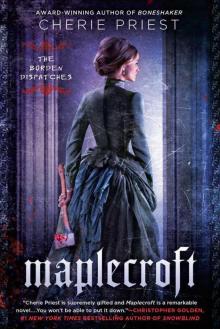 Maplecroft
Maplecroft Chapelwood
Chapelwood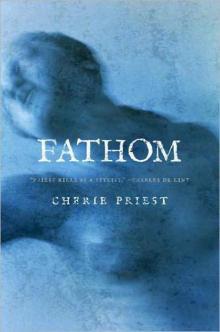 Fathom
Fathom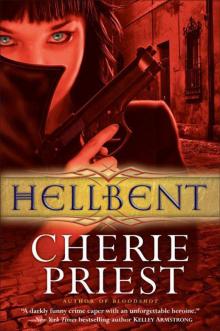 Hellbent
Hellbent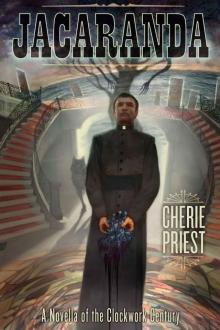 Jacaranda
Jacaranda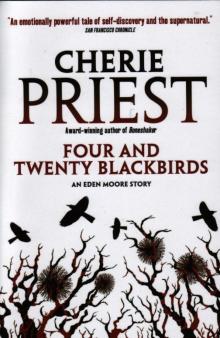 Four and Twenty Blackbirds
Four and Twenty Blackbirds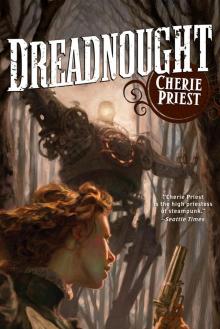 Dreadnought
Dreadnought Dreadful Skin
Dreadful Skin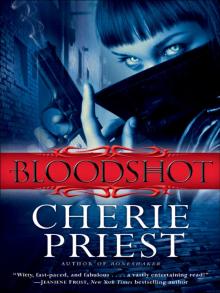 Bloodshot
Bloodshot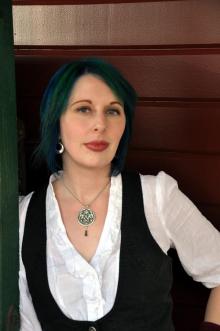 Tanglefoot
Tanglefoot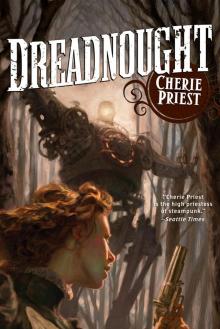 Clementine
Clementine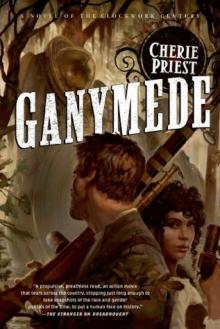 Ganymede
Ganymede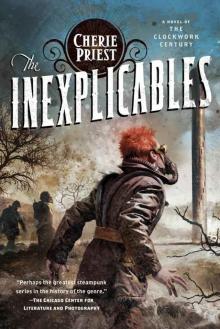 The Inexplicables
The Inexplicables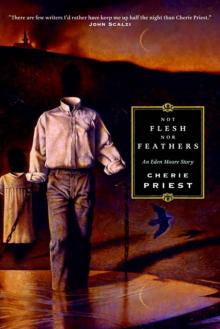 Not Flesh Nor Feathers
Not Flesh Nor Feathers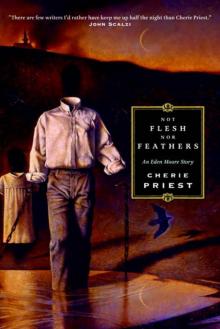 Wings to the Kingdom
Wings to the Kingdom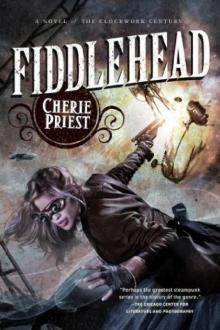 Fiddlehead
Fiddlehead Tanglefoot: A Story of the Clockwork Century
Tanglefoot: A Story of the Clockwork Century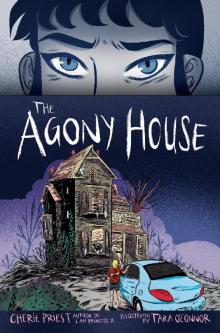 The Agony House
The Agony House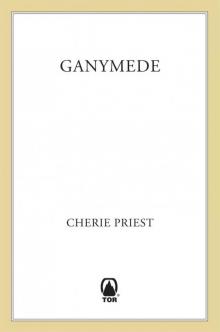 Ganymede (Clockwork Century)
Ganymede (Clockwork Century)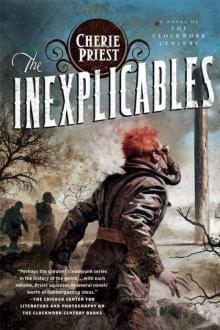 The Inexplicables (Clockwork Century)
The Inexplicables (Clockwork Century)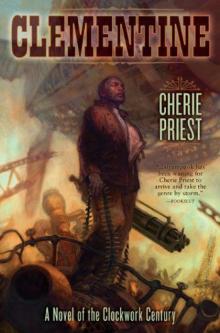 Clementine tcc-2
Clementine tcc-2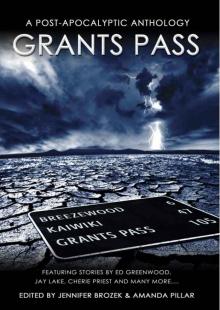 Grants Pass
Grants Pass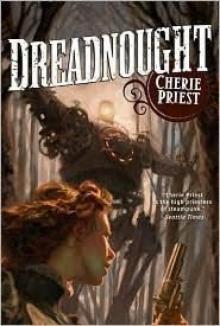 Dreadnought tcc-3
Dreadnought tcc-3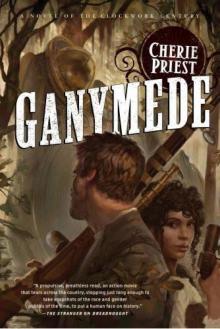 Ganymede tcc-4
Ganymede tcc-4